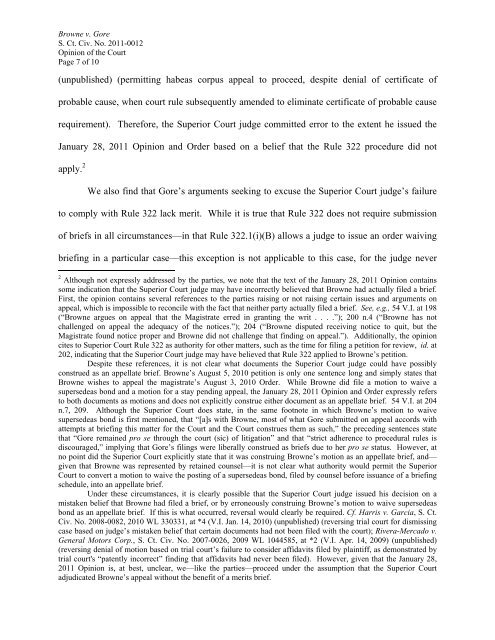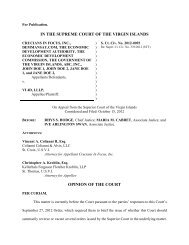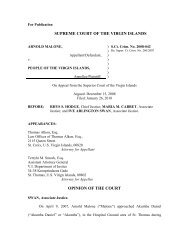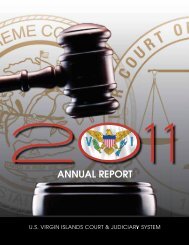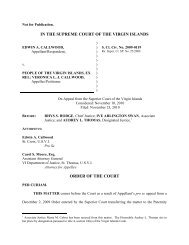IN THE SUPREME COURT OF THE VIRGIN ISLANDS OPINION OF ...
IN THE SUPREME COURT OF THE VIRGIN ISLANDS OPINION OF ...
IN THE SUPREME COURT OF THE VIRGIN ISLANDS OPINION OF ...
Create successful ePaper yourself
Turn your PDF publications into a flip-book with our unique Google optimized e-Paper software.
Browne v. GoreS. Ct. Civ. No. 2011-0012Opinion of the CourtPage 7 of 10(unpublished) (permitting habeas corpus appeal to proceed, despite denial of certificate ofprobable cause, when court rule subsequently amended to eliminate certificate of probable causerequirement). Therefore, the Superior Court judge committed error to the extent he issued theJanuary 28, 2011 Opinion and Order based on a belief that the Rule 322 procedure did notapply. 2 We also find that Gore’s arguments seeking to excuse the Superior Court judge’s failureto comply with Rule 322 lack merit. While it is true that Rule 322 does not require submissionof briefs in all circumstances—in that Rule 322.1(i)(B) allows a judge to issue an order waivingbriefing in a particular case—this exception is not applicable to this case, for the judge never2 Although not expressly addressed by the parties, we note that the text of the January 28, 2011 Opinion containssome indication that the Superior Court judge may have incorrectly believed that Browne had actually filed a brief.First, the opinion contains several references to the parties raising or not raising certain issues and arguments onappeal, which is impossible to reconcile with the fact that neither party actually filed a brief. See, e.g., 54 V.I. at 198(“Browne argues on appeal that the Magistrate erred in granting the writ . . . .”); 200 n.4 (“Browne has notchallenged on appeal the adequacy of the notices.”); 204 (“Browne disputed receiving notice to quit, but theMagistrate found notice proper and Browne did not challenge that finding on appeal.”). Additionally, the opinioncites to Superior Court Rule 322 as authority for other matters, such as the time for filing a petition for review, id. at202, indicating that the Superior Court judge may have believed that Rule 322 applied to Browne’s petition.Despite these references, it is not clear what documents the Superior Court judge could have possiblyconstrued as an appellate brief. Browne’s August 5, 2010 petition is only one sentence long and simply states thatBrowne wishes to appeal the magistrate’s August 3, 2010 Order. While Browne did file a motion to waive asupersedeas bond and a motion for a stay pending appeal, the January 28, 2011 Opinion and Order expressly refersto both documents as motions and does not explicitly construe either document as an appellate brief. 54 V.I. at 204n.7, 209. Although the Superior Court does state, in the same footnote in which Browne’s motion to waivesupersedeas bond is first mentioned, that “[a]s with Browne, most of what Gore submitted on appeal accords withattempts at briefing this matter for the Court and the Court construes them as such,” the preceding sentences statethat “Gore remained pro se through the court (sic) of litigation” and that “strict adherence to procedural rules isdiscouraged,” implying that Gore’s filings were liberally construed as briefs due to her pro se status. However, atno point did the Superior Court explicitly state that it was construing Browne’s motion as an appellate brief, and—given that Browne was represented by retained counsel—it is not clear what authority would permit the SuperiorCourt to convert a motion to waive the posting of a supersedeas bond, filed by counsel before issuance of a briefingschedule, into an appellate brief.Under these circumstances, it is clearly possible that the Superior Court judge issued his decision on amistaken belief that Browne had filed a brief, or by erroneously construing Browne’s motion to waive supersedeasbond as an appellate brief. If this is what occurred, reversal would clearly be required. Cf. Harris v. Garcia, S. Ct.Civ. No. 2008-0082, 2010 WL 330331, at *4 (V.I. Jan. 14, 2010) (unpublished) (reversing trial court for dismissingcase based on judge’s mistaken belief that certain documents had not been filed with the court); Rivera-Mercado v.General Motors Corp., S. Ct. Civ. No. 2007-0026, 2009 WL 1044585, at *2 (V.I. Apr. 14, 2009) (unpublished)(reversing denial of motion based on trial court’s failure to consider affidavits filed by plaintiff, as demonstrated bytrial court's “patently incorrect” finding that affidavits had never been filed). However, given that the January 28,2011 Opinion is, at best, unclear, we—like the parties—proceed under the assumption that the Superior Courtadjudicated Browne’s appeal without the benefit of a merits brief.


